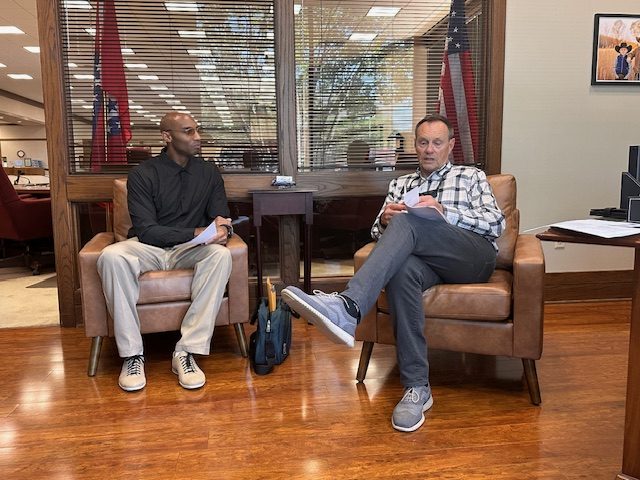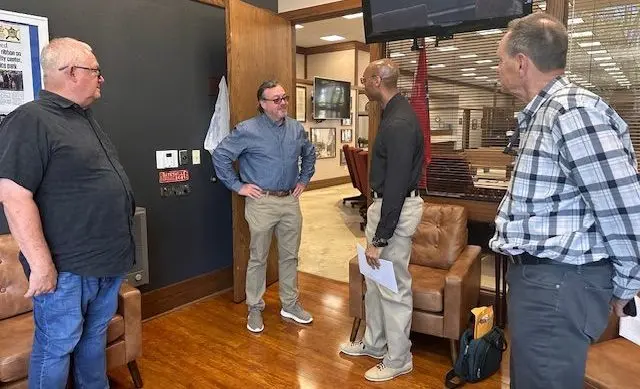Above (from left): Former state Rep. Stu Smith, current Arkansas Rep. Shad Pearce, Raymond Green, and Batesville Mayor Rick Elumbaugh
By Andrea Bruner, White River Now
Raymond Green has spent more years behind bars at this point than free. While he’s got another two decades ahead of him, one day he’d like to leave the prison life for good – with his debt paid in full.
***
Green grew up in a Christian household, attending services at New Testament Holiness Church three nights a week.
His parents divorced when Green was 12 or 13, and a few years later, he began to feel like he was missing out on the fun stuff his friends were doing on Saturday night because he was at church. So he started visiting other churches with friends.
Eventually, he said, he fell into the “wrong crowd” and got away from those values.
At some point, some of the guys in his new “crowd” ran the idea of committing robberies, and Green couldn’t let go of it.
“I said, you know what, that’s just free money out there. At that time, I wasn’t working. I had had a good job, working at Wood-Lawn Nursing Home as a housekeeper. … I ended up quitting that job for a girlfriend, which was one of my worst decisions. I did get work here and there, but I didn’t really have steady, stable work. So, I said, ‘Billy, we can just go hold up a place,’” he said.
The “Billy” in question was Billy J. Mason, who would end up driving the getaway car for Green, who was 18 at the time of the robberies.
“I feel so ashamed about it, but I was the one that actually approached Billy,” added Green, who was 18 at the time, while Mason was a year older.
“I was supposed to graduate a year earlier, but I was skipping school and got kicked out. I had to go to alternative school, and I eventually got my GED at the community college when I was 17,” Green said.
Green outlined the plan, where he would take the gun inside with him, demand the money, and Mason would have the vehicle waiting. “If they had refused, I would have been too scared to do anything but run out with nothing,” Green said.
The gun was a toy, Green said. “It was a realistic-looking firearm replica, and it would shoot yellow plastic balls, a little bit bigger than a BB,” he explained.
There were six incidents in a six-month period:
- Oct. 16, 2001 – Mason and Green went to the Holiday Inn first. Wearing a hood and mask, Green entered the hotel, pointed a pellet gun at the employee, and demanded money from the cash drawer as well as the safe box in the office.
- Oct. 28, 2001 – Police were dispatched to a break-in and theft at Sweden Crème in Westside in which money was taken.
- Nov. 9, 2001 – The Holiday Inn was robbed a second time. Wearing a hood and mask, Green entered with a gun and again pointed it at the employee, demanded money, and took it.
- Nov 26, 2001 – A panic alarm sent officers to a Fina station on Fourth Street after Green pointed the gun at the employee and demanded she give him all the money, before forcing her to cut the phone line, which she did.
- Jan. 29, 2002 – Green entered the Spring Valley Coastal station just north of town and pointed a gun, then demanded money from the cash register and the safe. The clerk did not have access to the safe, and he left.
- April 9, 2002 – Green entered Friedman’s Jewelry on Eagle Mountain Boulevard, ordered two employees to the floor while he took money out of the cash register as well as some jewelry that was later reportedly valued around $15,000. After telling the women to count to 50, he left.
***
After the fourth robbery, then-Sheriff Dan Johnson said he would be placing an undercover deputy inside businesses that seemed to be targeted, using off-duty officers, reserve deputies, and other undercover personnel. Still, Green and Mason changed their M.O. at that point to target a business during the daytime (Friedman’s).
As Friedman’s was robbed, witnesses were able to provide a description of a pickup believed to be the suspects’ truck. The truck was then seen leaving the Economy Inn and pulling into what was then known as Godwin’s Grocery. An officer pulled behind it with blue lights flashing, and Green and Mason were taken into custody without incident. Officers found the gun in the truck seat and a travel bag containing the jewelry and cash.
Aggravated robbery is a violent crime, and there were also counts of commercial burglary and theft of property.
The prosecuting attorney at that time, Don McSpadden, offered Green and Mason a plea bargain of 30 years.
“Billy took that 30 years,” Green said. “I said to myself, ‘That is just way too much time,’ so I didn’t take it. I believe my co-defendant did seven or eight years and was paroled out, but I took mine to a jury trial.”
The risk did not pay off.
Green said the jury had recommended a 28-year sentence, with a mandatory 21 years to be served, but when Judge John Dan Kemp handed down Green’s sentence, he ruled that the terms were to run consecutively, meaning one after the other.
Green was given 56 years, with a mandatory 39 years served under the 70 percent law.
Green said he knew at the time there needed to be justice, but he was still shocked at the number. When Green heard Kemp’s sentence, he felt the air go out of him, and he could only feel disbelief. He stood there before his mother, father, uncles, members from the church, and other supporters, and he watched the tears fall.
“I did do the crimes and I confessed to the crimes because I was in the wrong, but it was really painful for them to hear this, but the number of years was just unbelievable. I don’t think they thought it would come to something like that. Seeing that my co-defendant only did seven or eight years and I’ve done triple that, it’s time for relief. … The sentencing phase went off when the judge didn’t agree with what the jury said and imposed his own sentence. It’s too steep of a sentence, it really is.”
“Yet what is mind-boggling is the judge is the one who ordered the jury to render a sentence worthy of justice for the community, and the jury did with a mandatory 21 years’ incarceration, which I have fulfilled with 23 years to date. The jury was tasked with being the voice of the community, and they were silenced.”
Green also noted that the jury pool from which jurors were selected had no minorities.
“An objection was raised in court, to no avail. Being a minority, I couldn’t fathom the unconstitutional territory our Main Street courthouse was willfully treading into, denying minorities in a diverse community a role in their rightful civic duties,” he said.
Green also has a petition with a couple of hundred signatures asking for leniency on his behalf – including a signature from one of the robbery victims as well as her husband.
***
Green has been incarcerated for 23 years, and he hopes to walk away from the Cummins Unit one day and use his life to help others.
“In the county jail, after I first got arrested my girlfriend came to see me and we talked on the phone and it was just miserable to be away from my family, my loved ones, so I knew at that point right there needed to be a change, so that’s the point I started working toward rehabilitating myself.”
Green has never had a violent write-up. He said there are frustrating days, dealing with administration or knowing what to do or not to do with other inmates. “It’s a tough duality. There’s the way the administration runs things, but then there’s a way the inmates run things, so walking that line is tough,” Green said.
Classified as a 1B trusty, Green is a domestic worker in the home of the deputy warden, around the warden and his family in their private life.
“I’m blessed to be in the position I’m in. Right now, I am in a one-man room, so I can go to my room, and close my door, and not have to deal with anyone else in the barracks. I have a good job, I’ve been working for this deputy warden for the last three and a half years, and that position right there is probably the most trusting job that the administration can give you.”
He said it can be a challenge to transition from the real world back to the prison, where he has to be on guard at all times for safety and self-preservation, but he was given advice by another domestic, so that’s been helpful.
For example, if he were washing dishes at the domestic warden’s home and someone would walk into the kitchen, Green said he would make sure he was not holding any knives or anything like that. But it was more than that – when he crossed the “free line” or the prison boundary, he had to change his mindset and awareness of his surroundings. It’s probably not unlike a military service member adjusting to civilian life, he said.
Green also gets to participate in the Arkansas Department of Corrections’ “meritorious furlough” system, which allows prison inmates time off for good behavior. Furloughs are granted up to five days at a time every six months for good behavior.
Green said he had been thinking of a way he could give back to his community and had hoped to get furloughs so he might speak to youths incarcerated at the Independence County Juvenile Detention Center, but COVID put things on hold for a while.
He then came up with the idea of the Proper Citizens Behavior campaign. This is a message that encourages readers to remain calm, pay attention to law enforcement, and more.
As Green says on the poster, “Many times we’re unable to see the repercussions of our actions – that is, until we have to face the un-faceable: an accident, a death, or 12 jurors. Denounce bad habits and criminal behavior, please.”
The posters have gone to all parts of Arkansas, Green said. “It’s really taken off. It’s a message I want people to have, to stay focused and stay on the right path.”
***
Although the path to clemency lies with the Arkansas Governor’s Office, Green has also rallied support for his cause.
Among them is Batesville Mayor Rick Elumbaugh, who coached Green as a youth.
Elumbaugh said he sees individuals who have committed crimes like murder and rape paroled in less time than what Green has already served.
“The bottom line is 56 years seems to be way too excessive,” Elumbaugh said, as Green sat in the mayor’s office during a recent furlough. “I think at the end, Judge John Dan Kemp was just throwing things at him. … And Raymond, I’m sure as an 18-year-old, you were wiry, and you probably didn’t abide by what they wanted to hear, and they kept slamming things with you.”
Elumbaugh said when he was coaching physical education at school, if the kids were not listening, he knew how to grab their attention. “I’d take them out there and run them. I may tell them, ‘I’m going to make you run two laps,’ but then I’d add 25 more. That’s what they did to him – they made him run more laps. They continued to stack his sentence, but does this sentence fit the crime?”
Arkansas Rep. Shad Pearce — who, with former state Rep. Stu Smith, also visited with Elumbaugh and Green during the recent furlough — said he got to know Green’s case through articles sent by Green’s mother, Shirley Green.
“You have really been the example for other inmates. … No one has ever talked as highly about anyone as you. I was impressed,” Pearce told Green.
 Above, from left: Raymond Green, Batesville Mayor Rick Elumbaugh
Above, from left: Raymond Green, Batesville Mayor Rick Elumbaugh
Elumbaugh said he asked another judge what it would take for Green to get another trial and was told missing evidence or new evidence not previously presented might warrant a new trial. He did not know if the racial inequity on the jury would be enough to get a new trial.
Pearce, who spent 28 years in law enforcement, said it is tough to get a new trial, but he commended Green for his positive attitude.
“He went in front a new governor (for a commutation), but I’m sure she’s kind of snakebit from what happened to her dad,” Elumbaugh said, referring to when Mike Huckabee was governor and had granted clemency to Wayne Dumond, who raped and murdered a woman after his release, and to Maurice Clemmons, who went on to murder four police officers near Tacoma, Wash.
“But that’s not Raymond Green,” Elumbaugh stressed. “His life has changed. Raymond needs to get out and be a productive citizen. He’s got another 20, 30 years in the workforce.”
Elumbaugh and Smith, who also coached Green in school, both said they were willing to serve as character witnesses to aid in Green’s release.
Elumbaugh said he was amazed that Green is given so much trust that he is granted one-week furloughs to come to Batesville, then return to prison.
“That should be enough,” said Elumbaugh. “They’re trusting this guy enough to come to my office and anywhere else.”
Green also works on the warden’s house detail. He said he walks right out the front door of the prison and … self-surrenders at the end of the day.
“That’s enough for me, because as frustrating as your situation must be, you’re given the opportunities you have and you still have the discipline you have to do what you need to,” Smith said.
Smith said Green is a model prisoner, the type the wardens want inside those walls.
“I’m so grateful and thankful y’all are willing to speak up for me and talk to individuals for me,” he told Elumbaugh, Pearce, and Smith.
Green said at one time he wanted to come back to Batesville upon his release and find employment, but lately he’s been drawn to attending a Bible college in Colorado. “I was really thinking about going there and enrolling in that Bible college.”
“You can go to that college, and then you can come home,” Elumbaugh said. “I still think you’ve got a great future.”
For Elumbaugh, the bottom line is that the jury wanted 21 years, and 200+ people who signed a petition have said enough time has been served.
“His story needs to be told,” Elumbaugh said.
Images: Andrea Bruner, White River Now
Have a news tip or event to promote? Email White River Now at news@whiterivernow.com. Be sure to like and follow us on Facebook and Twitter. And don’t forget to download the White River Now mobile app from the Google Play Store or the Apple App Store.
Get up-to-date local and regional news/weather from the First Community Bank Newsroom on Arkansas 103.3 KWOZ every weekday morning and afternoon. White River Now updates are also aired on weekday mornings on
93 KZLE, Outlaw 106.5, and Your FM 99.5. Catch CBS News around the top of every hour on 1340 KBTA.







